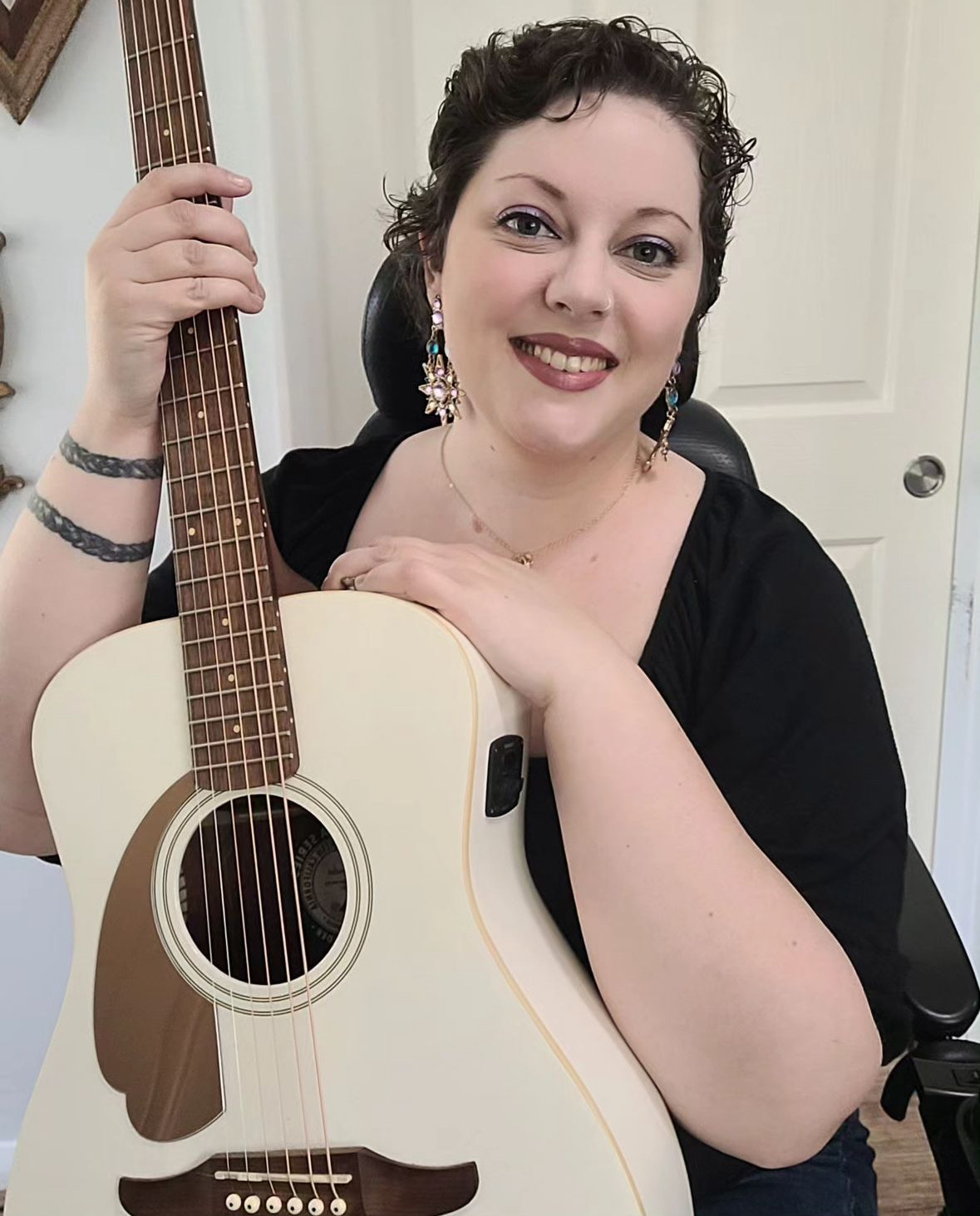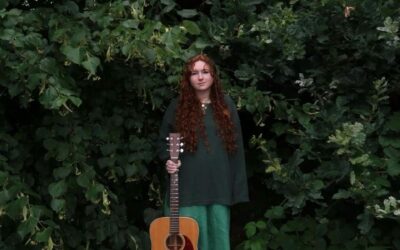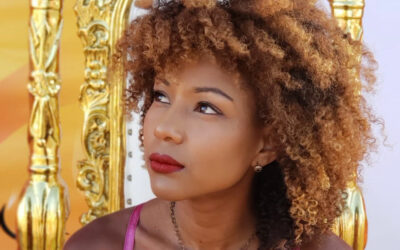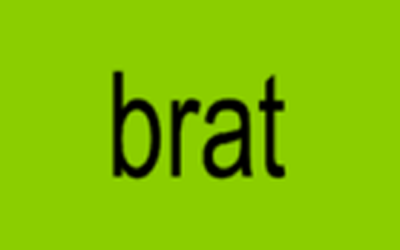Q) Can you tell us about your journey into music? What inspired you to pursue it, and how has your identity influenced your musical path?
A) Music was always going to be a part of my story, even if it wasn’t related to advocacy. My mother says I’ve been singing since I opened my mouth, so it was kind of a done deal! My parents are both musical, Mum plays the piano, Dad plays guitar and bass and they both sing, so I was always surrounded by music, and growing up in the church community meant that singing has always had a lot of meaning. When my illness developed into disability, I realised that there were stories I could tell that were underrepresented. There are a lot of pop songs that tell us we’re wonderful just the way we are, or talk about the hardships of life – but when they’re sung by able-bodied pop stars, people with disabilities are left wondering if those songs include us.
Q) Living with a chronic illness and using a wheelchair can present unique challenges. How has your condition impacted your approach to making music and navigating the music industry?
A) I’m very much at the start of my journey – I’ve been busking and playing markets for a year or two, and I’m getting a few proper gigs. But my challenges have already impacted the way I do things. I’ve had to explain to people that I don’t have the stamina of people who are well, and I have to be explicit about my access needs in advance. But in every situation, I see it as a teaching opportunity. If I’m the first chronically ill and disabled musician someone is working with, I want them to come away knowing more about our community, so they’re better prepared for the next time. Maybe they’ll automatically point out the accessible parking and bathroom or ask someone if they need breaks. I never hide the ways my conditions cause me to struggle, because I want people to learn more about them.
Q) Your identity as non-binary is an integral part of who you are. How does your gender identity influence your music and the messages you convey through your art?
A) I’m very careful to avoid gendered language in my music, partly because it doesn’t reflect me, and partly because I want more people to be able to relate to and sing along with my songs. I identify as a non-binary woman, as I’m not bothered by society seeing me as a woman, and I usually feel comfortable with the female-ness of my body (and honestly often have fun with the feminine look), but I personally feel very unconnected to gender as a part of my identity. I don’t use terms like ‘woman’, ‘lady’, or ‘girl’ to self-identify. And it’s tricky, because I’m still in the process of coming out to the people in my life, so many people use those terms for me. My producer tried to do some rewrites of my song ‘Wheelchair Babe’, and he used those terms – no fault of his, as it’s easily assumed that I’m a cis-woman. I explained my identity to him, and why I avoid using those terms, and also why I want to keep my music clear of those, so that others who avoid gendered terms can freely access my music.
Q) Many people may not understand the intersectionality of being non-binary and living with a chronic illness. Could you share some insights into your experiences and how they shape your music?
A) Some of the overlap between the two is uncomfortable to think about, but important to look at. When I was first discovering my non-binary identity, I was surprised to learn that people with gender non-conforming identities were more likely to live with health issues. Chronic illness is often not taken seriously or believed – as are non-binary identities. If you tell a doctor that you identify as non-binary, you risk them dismissing the rest of what you say and experience as fanciful or a symptom of being online too much. Non-binary identities often aren’t present on medical forms, so we start our medical journeys being told we don’t exist. I select the ‘F’ because it tells the doctor what equipment they’re working with, but that form tells me there’s no space for my identity, so I have no idea how safe or open that discussion is going to be. A lot of my music expresses the feeling of being dismissed, and of not being listened to, and I allow myself to be angry and frustrated, while at the same time validating my own identity – knowing that it’s up to me to do so.
Q) Accessibility is a crucial issue in the music industry. What are some of the barriers you’ve faced as a musician who uses a wheelchair, and what changes would you like to see to make the industry more inclusive?
A) A heart-breaking experience was at my town’s local Eisteddfod (a singing competition) last year. The stage in our local theatre doesn’t have a ramp, and if they ever need to get a wheelchair on the stage they hire a chair lift. Wires got crossed and it wasn’t done in my case, so I sang with my wheelchair parked on the floor. I won first prize in my section, and our adjudicator had to squat down to hand me my trophy from the stage. I ended up writing to the local paper, who chased up the theatre and wrote a front-page article, and apparently their plans for a permanent chair lift are happening a little quicker! I believe that, if a venue can have stage access for a wheelchair, then it should. Theatres, nightclubs, churches – too often, venues are accessible for those of us with disabilities, but only as spectators, not as performers. Some places have the excuse of size or age, but many more do not. I would love for disabled performers to have so much pull in the industry that venues improve access just for the chance of having us on their stages!
Q) Your music often touches on themes of resilience and empowerment. How do you draw from your personal experiences with chronic illness and disability to inspire your audience?
A) I treat my music like therapy. It ends up being a message, but at the beginning, it’s usually about expressing and processing a feeling. ‘The Great Divide’ was written in the sadness of being unable to get on my local theatre’s stage, and ended up asking society to answer for the disability divide. ‘Pretty Disabled’ came about when a dear friend with disability told me I couldn’t call myself disabled, because I was too smart, and I wanted to explain to her that you could be disabled, smart and pretty, all at once. ‘Wheelchair Babe’ was written when I started dating my partner, and I started seeing myself in a new, desirable light, and wanted to make sure other people with disabilities knew they were the absolute bomb as well. My actual therapist often jokes that, when I go through some intense emotion, there’ll probably be a song ready in a month or two – she’s often right!



Q) Representation matters, especially in the music industry. As a non-binary musician with a disability, how do you hope to contribute to greater visibility and understanding within the industry?
A) Sometimes the most simple representation is the most impactful. Just existing is so incredibly powerful. I am still at the point in my journey where I’m letting people know about my non-binary identity – this article is a huge step in that journey, and is encouraging me to share it with the many friends and family who aren’t aware. And part of that is because, in my community, there isn’t much representation. My country town is quite small and conservative, and my upbringing was shaped by religion, and both communities often have strict ideas of gender. Gender non-conformity isn’t common, or understood. But my community extends beyond that. Like I mentioned before, many in the community of chronic illness and disability are also in the cross-section of gender non-conforming, and now that I’ve been through the journey of understanding myself to be God-made and God-loved and exactly who I need to be, then I want to encourage people in that wider community to exist a little louder and a little braver, and to be able to accept themselves, especially if they are also in immediate communities that aren’t as understanding.
Q) Collaborations can be powerful tools for creating meaningful art. Are there any artists or organisations you’ve collaborated with that have helped amplify your message or support your journey?
A) It wasn’t connected to my music, but an organisation called Disability Maternity Care have been hugely supportive. The CEO heard me speak at a tiny little get-together of local planners that my support coordinator had me speak at two years ago, and they went on to invite me to speak at a handful of their own events. I have been producing advocacy videos on YouTube since 2020, but their recognition was the first time I felt like a legitimate disability advocate, and gave me the confidence to keep pushing forward, and I will always be grateful to them for seeing something in me.
Q) What advice would you give to other non-binary individuals or people with disabilities who aspire to pursue a career in music despite the challenges they may face?
A) Your message is important, and needs to be heard, and those hurdles are worth the work. We overcome so many battles just by existing every day. For many of us, we have conditions that actively fight against us, or we live in a world that dismisses us. We are always learning to adapt and learn better ways of coping, and your music journey will be the same. And the more of us who do this, the smoother the road will be for the ones who come after us.
Q) Lastly, what upcoming projects or initiatives are you excited about, and how do you hope to continue making an impact through your music and advocacy work?
A) Later this year, I’ll be on the main stage at my town’s annual music festival, the Wingham Music Festival. I played ‘Wheelchair Babe’ at their open mic session last year and got the notice of the organisers, and now they’re wanting to do a showcase of artists with disabilities up on the main stage, and they want me up there for a solo session! I was also reached out to by a local community college who are running a community project and are interested in me hosting some podcasts, so I’m keen to see if that comes together. I have found more people reaching out to me for opinions and involvement about disability issues and advocacy, which is exciting. I’ll continue to keep up with my videos on my Warning: Honesty Ahead YouTube channel, as I love to share topics that I personally find interesting, and hopefully I can share more album updates there as the year goes on. I’m just enjoying where the journey takes me, and thanking God for each opportunity that comes my way!




